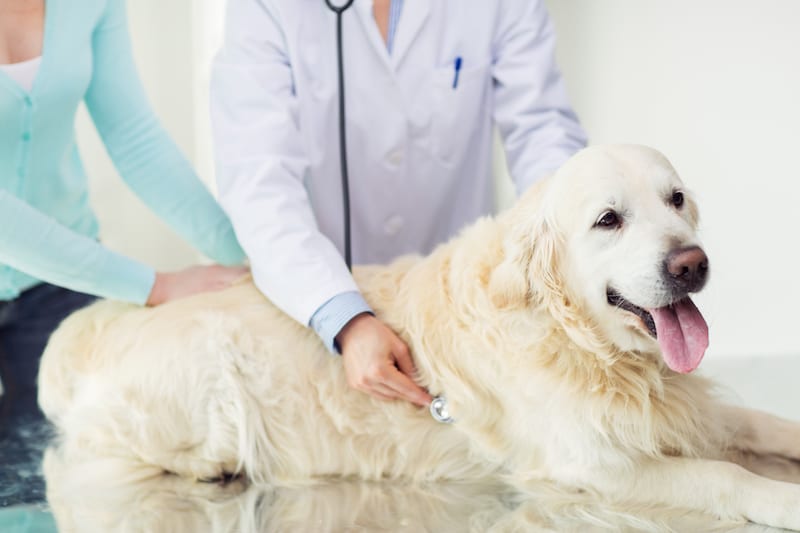
The Top 3 Benefits of a Pet Wellness Exam
A regular pet wellness exam is one of the best actions pet parents can take to ensure the long-term well-being of their pets. In simple terms, pets live shorter lives than us humans. So when your pet gets a pet wellness exam once a year, it’s like a human getting a physical every 3-5 years. A lot of health changes can happen in that time.
When pet parents get an annual pet wellness exam for their pets, it allows your veterinary team to find and address health issues before they have a chance to escalate into a more serious condition that costs more to treat, and where a positive outcome is not as certain.
There are so many benefits to getting an annual pet wellness exam, and blood testing to keep your pet healthy for the long-term. Here are some of the main reasons why getting a pet wellness exam and the related blood testing will help keep your dogs & cats healthy & happy for the long term. Pet wellness exams:
- Extend the Lives of Your Pets – The most important benefit of a pet wellness exam is that it helps your pets live to a ripe old age. Common sense (and medical research) shows that when you catch a health problem in the early stages, you catch the condition or illness before it becomes critical or threatens your pet’s life.
- Mitigate Silent Suffering of Your Pets – Even when your pets are living a cushy life, they instinctively know that showing signs of illness or weakness makes them a target for predators. So even if your pets aren’t feeling good, they are great at hiding it in the interests of self-preservation. The best way to overcome hidden discomfort is a pet wellness exam and blood testing. This process allows your veterinarian to uncover any conditions your pet is hiding, to provide treatment and relief, and get your pet out of a mode of silent suffering.
- Result in Lower Veterinary Bills – While the primary concern is for the well-being of your pet, a pet wellness exam plus related blood work can help your pocketbook, too. It almost always costs less to treat your pet for a health condition in the early stages rather than the late stages.
Why Do I Need Blood Work Along With A Pet Wellness Exam?
When you combine blood work with a physical pet wellness exam, you get a powerful combination of information that can help diagnose if your pet’s got a health issue or not.
In the physical exam, your veterinarian will physically inspect your pet. Activities in the physical exam include:
- Listening to the heart and lungs
- Checking eyes and ears
- Checking teeth for signs of dental disease
- Checking the body for masses or tumors
Standard blood testings include:
A CBC (complete blood count) – This blood test allows your veterinarian to look at your pet’s blood to determine if they have any health issues not indicated in the physical exam. A CBC blood test looks at:
- Red blood cell count (low red blood cell count can indicate anemia and/or dehydration)
- Hemoglobin count (this shows how well red blood cells are carrying oxygen to tissue and muscle)
- White blood cell count (a high WBC indicates infection or inflammation); platelet count (shows how well blood clots after injury).
A Chemistry 14 Blood Test is a standard & comprehensive blood test that measures 14 important indicators of health, and provides valuable information about the health of your pet’s kidneys, liver, electrolyte count, acidity/alkalinity, blood sugar, and blood proteins.
A Thyroid test measures your pet’s thyroid hormone levels, and this information is used to diagnose and treat hypothyroidism (an underactive thyroid) or hyperthyroidism (an overactive thyroid).
The bottom line is that a blood panel, in conjunction with a physical exam, is the best way to diagnose health issues and then treat them. A typical question is: Should I withhold food & water for pets prior to a blood test? The answer is: No, let your pets eat and drink prior to a blood test. The only time we ask pet parents to temporarily withhold food before a blood test is when we’re doing a cholesterol test.
What Changes Do I Need To Make After A Pet Wellness Exam?
Once your veterinarian has done a physical exam and reviewed the results of blood tests with you, a variety of lifestyle changes and/or medications may be recommended. Typical changes that can occur after a pet wellness exam include:
- Dietary changes – Your veterinarian may recommend a change in your pet’s food either for weight management, blood sugar management, or management of a health condition through nutrition or nutraceutical pet foods (pet food formulated with ingredients to treat a certain health condition)
- Adjustment in exercise
- Physical therapy
- Pain management
- Medications…and more.
In summary, we recommend a pet wellness exam and blood testing every year, and can say, hand’s down, this is the most important action you can take to ensure the long-term health and well-being of your beloved pets.
Pet Wellness Exam Discount Offered in April: Note to Sky Canyon Veterinary Hospital Pet Parents: In the month of April 2018, we are offering a screamin’ deal on pet exams & blood work. Save $25 off the cost of an annual exam, and blood testing that includes a CBC, a chemistry 14 blood panel & a thyroid test. (Offer expires April 30, 2018)
Need to schedule a pet exam for your dog or cat? Schedule and get a pet wellness exam and blood testing during the month of April 2018 & save $25. Call Sky Canyon Veterinary Hospital at 970.985.4911, or Email Us to schedule your pet wellness exam & blood testing.
